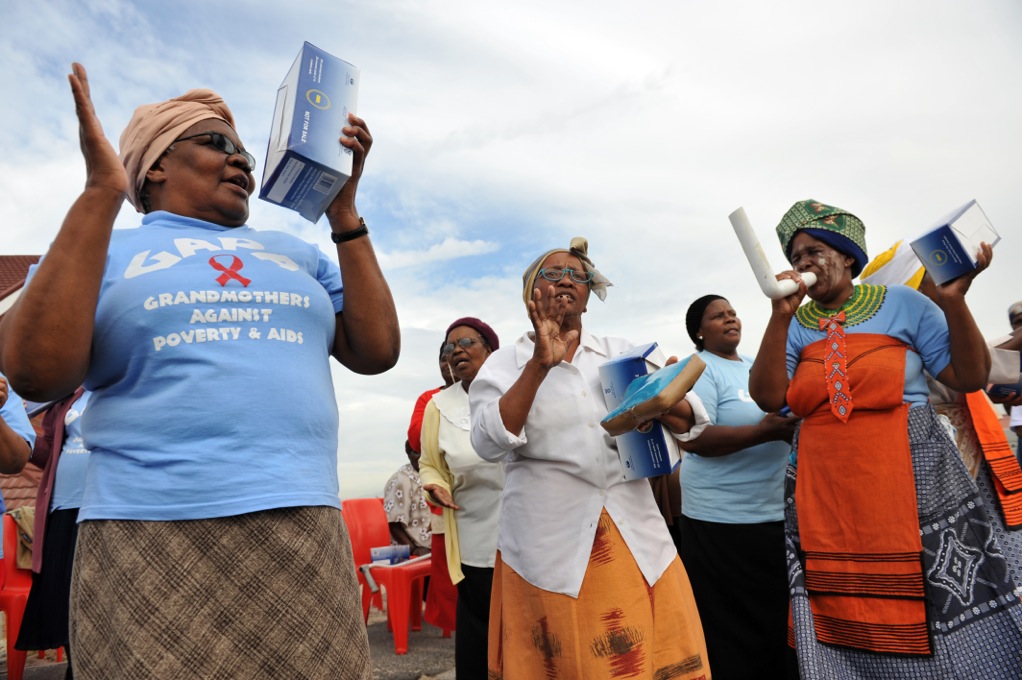
Photograph by Eric Miller
When you picture a traditional African grandmother, you probably see a woman who is caring but feeble, ever present to provide her guidance and unconditional love.
But it is not often that elder women are viewed as vital agents of social change.
In 2010, while on a study abroad in South Africa, I met a group of grannies who transformed how I viewed advocacy and social change. These elder activist women have shaped me both personally and professionally. Through intimate conversations where they shared their life stories to our casual laughter over tea each morning, I gained inspiration from these heroines of an older generation, while defining my passion for global health.
I watched and learned from these women for two summers, gathering information on their life stories and understanding the important role the organization Grandmothers Against Poverty and AIDS played in their lives.
Founded in 2001 by a group of ten South African elder women in Khayelitsha township, Grandmothers Against Poverty and AIDS (GAPA) is a grassroots organization aimed at decreasing poverty and AIDS in the surrounding communities. The organization now boasts over three hundred grandmother members.
As HIV/AIDs decimates traditional and social family structures it renders elder women sole caregivers to extended families suffering from the disease.[1] Underscoring the reality of the shifting care-taking roles resulting from the HIV/AIDS pandemic, USAID explains that, “during the 30 years of the global HIV epidemic, an estimated 17 million children lost one or both parents due to AIDS. Ninety percent of these children live in sub-Saharan Africa.”[2] Sadly, in South Africa, where the HIV prevalence is estimated at over twelve percent, this ever-present reality reaches across generations in families where children, mothers and grandmothers are picking up the pieces in Khayelitsha Township.[3]
But GAPA grannies are working to change the status-quo.
Run by grandmother leaders, GAPA works to empower grandmothers ultimately allowing elder women leaders to reach the larger surrounding community. Through services that include educational workshops, income generating projects, and aftercare services for children, GAPA provides an organizational foundation for elder women to cope with the care-taking demands of HIV/AIDS, while proactively promoting reduced transmissions, greater awareness and the importance of women in the struggle to fight HIV/AIDS.
Providing a place of comfort and security, through psycho-social support groups and educational programs, the organization has become a social network of grandmothers working together to educate and empower themselves, as well as their community. Monthly meetings, taught by grandmother members, serve as important educational opportunities informing communities on issues such as HIV/AIDS, sexual rights, human rights, parenting, and bereavement. Through workshops aimed at increasing income, grandmothers also learn gardening and handy-crafts skills. As one grannie explained:
“They [GAPA] take poverty from homes. They taught income generating projects here. You can use your hands and put something on the table for the children.”
Sporting their GAPA logo t-shirts and singing voices, these grandmothers have become a visual representation of knowledge and education in their communities. From handing out condoms on township streets, to encouraging neighbors, community leaders and friends to attend the meetings held at GAPA, these elder women are becoming the social fabric tying together their community in a band of resistance against HIV/AIDS.
As one GAPA grandmother member explained:
“I get rest [here] and the stresses went off. It made [me into] something. I just talk to the others [and get support]. Everyday I am longing to come here; it is happy everyday. I realized I am not the only one. AIDS is in all our houses. I am becoming stronger.”
The strength of these grandmothers continues to inspire me. It is time we recognize elder generations of women as active and important change-makers. The GAPA grannies have proven themselves by showing that with tools, support and a drive to make a difference, elder women are key community leaders in the struggle to decrease HIV/AIDS in South Africa. As Sanam Anderlini states, “They are committed because it is their own lives: the political is deeply personal. They have no exit strategy. Time and again, women prove the invaluable contributions they can make, and their willingness to work for peace.”[4]
The GAPA grannies have become my family. They have taught me so many lessons, including how to use my voice and skills to share narratives of strong women making a difference in the world. Today, as a Global Health Corps fellow working as the Research and Documentation Officer for the Elizabeth Glaser Pediatric AIDS Foundation, I carry the wisdom and determination I learned from the GAPA grannies with me every day as I embark on my own journey to advocate for health equity.
[1] Nampanya Serpell in Kamya, Hugo and Cynthia Cannon Poindexter. “Mama Jaja: The Stresses and Strengths of HIV-Affected Ugandan Grandmothers.” Social Work in Public Health (2009): 4-21. Print. p.7.
[2] “Orphans and Vulnerable Children Affected by HIV and AIDS.” USAID.GOV. Web. 8 Jan. 2015. <http://www.usaid.gov/what-we-do/global-health/hiv-and-aids/technical-areas/orphans-and-vulnerable-children-affected-hiv>.
[3] “UNFPA South Africa.” UNFPA South Africa– HIV. 10 July 2014. Web. 9 Jan. 2015.<http://countryoffice.unfpa.org/southafrica/2013/05/03/6675/hiv/>.
[4] Anderlini, Sanam Naraghi. Women Building Peace: What They Do, Why It Matters. Boulder: Lynne Rienner Pub. 2007. Print.
